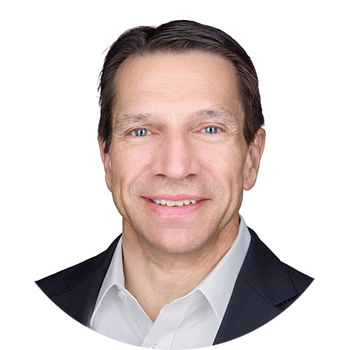
By Lucrum Staff & Clients
Not all CFOs are created equal – so how do you cut through the noise? We asked business leaders and finance pros to help us understand what makes a really great fractional CFO. Here’s what they said.
Q. What traits set great fractional CFOs apart from average ones?

A: “An average fractional CFO is pretty good at some things and not at the rest. A great CFO can wear many hats. My fractional CFO is a mind reader. He’s a psychiatrist. He’s a counselor. He’s an architect. He even has networking skills. I can take him out to dinner with my board, and he’ll be a good conversationalist. He wears every hat I ask him to wear well.”
– Steve Barker, CEO, Karis Management Group

A: “Their willingness to push back. We affectionately refer to our CFO as our “CF-No” – and that’s a good thing. As an entrepreneur, I’m constantly chasing new ideas. A great CFO serves as a counterbalance, keeping the business grounded in what’s strategic, not just exciting. I need someone I can trust to say “no, that’s not the right move right now.”
– Steven Kasay, President, Kasay Construction

A: “Cultural fit. We’ve worked with financial resources in the past that weren’t a great fit culturally and it just made things difficult for everyone involved. We have four or five people communicating with our CFO regularly. They need to get along. Honesty is important too. I trust our CFO will give us an honest assessment if we’re making a decision on hiring or growth.”
– Dee Burton, President & Owner, AFTERDISASTER

A: “Foresight. A great CFO anticipates needs and flags issues early. The advice they give is concise and accurate and is designed to make the business owner think, not tell them how to run the business. At Lucrum we often joke with clients that we always get the last word – ‘Yes sir” or “Yes Ma’am’.”
– Jeff Heybruck, President, Lucrum Consulting
Q. What do you think is misunderstood about the role of a Fractional CFO?

A: “I always thought a CFO was the person who just said “no.” Every time I asked for something, every time I wanted to hire somebody, open a new office, all of the sudden there were spreadsheets and analysis. I expected a fractional CFO to be the same, but instead he told me every decision is ultimately up to me. He still keeps me in check, reminding me my decisions should be based on more than my gut feeling. He provides his insight, his analysis, his breakdown, but ultimately it’s my decision.”
– Steve Barker, CEO, Karis Management Group

A: “I didn’t realize how much of a true partnership it would become. Our CFO monitors what’s in the pipeline and where we stand operationally. It’s not a surface-level engagement—they really plug into our business. It feels like having a dedicated, high-level team member who’s focused on our financial health during their time with us. I wasn’t expecting that, and it has been a huge value.”
– Steven Kasay, President, Kasay Construction

A: “Some assume they’re not a ‘real’ CFO, when in fact they provide the same strategic leadership as a full-time CFO. Also, many mistake them for a senior bookkeeper or controller. Instead, a fractional CFO is a strategic advisor who applies analytical rigor to drive better business decisions.”
– Axel Wulff, CFO Business Advisor, Lucrum Consulting

A: “Some think a fractional CFO is just a glorified controller, when in reality a good fractional CFO should help lead financial strategy. Too many businesses have had a CFO that had the wrong skillset and focused too much on accounting. We’ve seen a prospect who had a fractional CFO and it seemed like all that person cared about was GAAP financials due to their auditing background. We had to ask the client- what value does that add? The answer was ‘I really don’t know.’”
– Jeff Heybruck, President, Lucrum Consulting

A: “There is almost no crossover between what a bookkeeper or CPA does and what a CFO does. We’ve had a bookkeeper for 12 years and a CPA. Our CFO came in and, almost immediately, under his tutelage, our eyes were opened to what we really can and should be doing financially.”
– Dee Burton, President & Owner, AFTERDISASTER
Q. What advice would you give another business owner considering hiring a fractional CFO?

A: “Do your research and have several meetings with them before you hire. There aren’t a ton of businesses in our space. Our CFO took the time to grasp the ins and out of our business. He has been diligent about pursuing information about our industry – a true partner. He’s also just a great guy. We’ve enjoyed getting to know him. Don’t underestimate the value of finding someone you enjoy working with.”
– Dee Burton, President & Owner, AFTERDISASTER

A: “As a CEO or owner, you need somebody. Somebody that is going to hold the reins while you’re out with the wild horses running through the field. Somebody to pull back those reins. Somebody has to bring you back to reality. Somebody needs to remind you: ‘Hey, I know you want to do this, but have you thought about it in this way?’ That’s where the fractional CFO comes in. They should have a strategic mindset. They should get to know your company. They should even get to know your mindset as a CEO.”
– Steve Barker, CEO, Karis Management Group

A: “You need someone who is looking at the long-term financial strategy for your business, and you likely don’t have the time to do it. As an entrepreneur you are often just trying to make it through the next 30 days. Between running jobs and managing the team, I just can’t give financial forecasting the attention it deserves. That’s where a fractional CFO steps in. They bring the discipline and forward-thinking every business needs.”
– Steven Kasay, President, Kasay Construction

A: “Ask how they measure success. A good CFO should measure it the same way the client would measure it. Some measure by growth, profitability, business value, or time off. It’s 100% up to the business owner and the CFO has to adapt or decide it’s not a good fit. In the end, it all comes down to the client and if they are OK with it for X, Y, and Z reasons, then it’s up to the CFO being OK with that client decision as long as the client understands the risk and repercussions.”
– Jeff Heybruck, President, Lucrum Consulting
Q. What value does a great Fractional CFO bring?

A: “When I paint as a CEO, I paint with a big wide brush. A great fractional CFO gets the fine-tip brush out and starts filling in all of the details to complete the picture. I can say to my CFO, ‘model this for me,’ and he will come back that afternoon with a report that is exactly what I was imagining so I can make my decision. He takes the data and analytics and helps me see where we’re going.”
– Steve Barker, CEO, Karis Management Group

A: “Visibility. Before hiring a CFO, we couldn’t clearly track profitability on a job-by-job basis. We were making money on some projects, but had no idea why others were underperforming. Our CFO helped us build out a labor tracking system in QuickBooks that finally gave us clarity. Now, we bid jobs smarter. A great CFO brings structure to the chaos and helps turn gut instinct into measurable insight.”
– Steven Kasay, President, Kasay Construction

A: “A great CFO should be able to help organize the financials in a way that generates reporting that’s used for decision making. Our Chart of Accounts was very large, and our CFO brought order to this very extensive set of data. He was then able to extrapolate information that we weren’t even aware we could get and he brought our accounting to a place where we now have timely financials, correct financials. We have budgeting and forecasting I can trust, which we never had before. He can give us snapshots of our finances at any given time. We couldn’t do that before. He created a process for our WIP reporting, which we never had before either.”
– Dee Burton, President & Owner, AFTERDISASTER
About Our Client Contributors

AFTERDISASTER is a woman-owned small business that specializes in the provision of all types of emergency and recovery services for water, fire, smoke and mold damage victims in residential, commercial, institutional and governmental buildings throughout the US and Caribbean.
Karis Management Group is an appraisal management firm committed to the highest standards of integrity, compliance and service excellence. Guided by their mission—reflected in the name “Karis,” the Greek word for grace—Karis Management Group dedicates 100% of its net profits to support and uplift local communities through partnerships with dozens of nonprofits.
Kasay Construction is a custom homebuilder in North and South Carolina. Known for their expertise in Passive House standards, they specialize in building luxury high-performance, energy-efficient homes designed for both beauty and durability.





